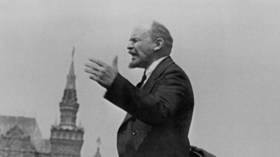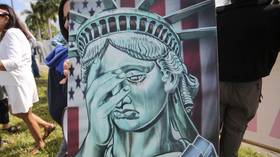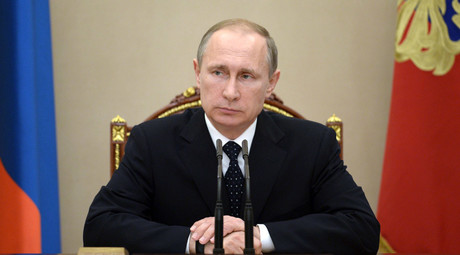1919-2019: UK still involved in anti-Russian campaign after 100 years
Neil Clark is a journalist, writer, broadcaster and blogger. He has written for many newspapers and magazines in the UK and other countries including The Guardian, Morning Star, Daily and Sunday Express, Mail on Sunday, Daily Mail, Daily Telegraph, New Statesman, The Spectator, The Week, and The American Conservative. He is a regular pundit on RT and has also appeared on BBC TV and radio, Sky News, Press TV and the Voice of Russia. He is the co-founder of the Campaign For Public Ownership @PublicOwnership. His award winning blog can be found at www.neilclark66.blogspot.com. He tweets on politics and world affairs @NeilClark66
Published time: 31 Jan, 2019 11:06

The Western powers have Russia in their sights. Propaganda is at fever pitch. Sounds familiar? No, I’m not talking about 2019, but 1919, when Churchill was supporting military intervention against the Russian government.
One hundred years ago, World War I may have ended but the world was hardly at peace.
Then, as now, Russia was a target. Bolshevik rule, only established in late 1917, was threatened by a Western-backed foreign intervention to help the anti-Bolshevik White Army regain power.
Today, the biggest hawk on the scene in Britain is Gavin Williamson, the defense secretary. In 1919, it was one Winston Churchill, secretary of state for war. At least the titles they gave government ministers were more honest in those days.
In March 1919, Churchill went over to Paris, where the Versailles Peace Conference was taking place, to push for more war.
The great cigar-smoker denounced "the baboonery of Bolshevism" and, as historian AJP Taylor records, persuaded the Supreme Council to "try intervention on a large scale."
Taylor details what the British brought to the anti-Bolshevik crusade. "Surplus British tanks and other munitions of war, to the tune of £100m, were provided for the 'Whites.' British volunteers fought with Kolchak, self-styled supreme ruler of all the Russians, in Siberia. A few served with Denikin in southern Russia. There were substantial British forces at Archangel and Murmansk… A British force occupied Baku, and another ranged along the frontier which divided Russia from Afghanistan."
There was even, believe it or not, a battalion under the command of Colonel John Ward, a former trade union leader and the Liberal-Labour MP for Stoke-on-Trent. Say what you like about Ward, but at least he led from the front, unlike the pro-war politicians and chick-hawk pundits of today who would emulate Usain Bolt if put anywhere near a war zone.
Overall, Churchill's policy cost Britain around £73 million, according to one estimate. As his biographer Roy Jenkins points out, Churchill, "showed no comprehension of the war-weariness of Britain… His pulsating energy made him rarely weary, and almost never of war."
The secretary of state for war was not alone in trying to topple the Russian government. The same aspiration informed the official positions of the US, France, and Japan. It was about destroying Bolshevism.
You could argue, in defense of Churchill and the interventionists, that the Bolsheviks themselves, and in particular Leon Trotsky, had been calling for a worldwide revolution. Communist ideals were spreading, and in 1919 as strikes and mutinies spread across the nation, many thought Britain itself was on the brink of revolution.
Even if one were to accept that as a valid reason for intervening, however, there can be no such excuse today for Britain's hostile actions towards Russia.
There is no ideology now that the Kremlin is keen to export, unless we call respect for national sovereignty and international law an ideology. Yet Russia is still in the firing line, even though the Red Flag no longer flies in Moscow.
This tells us that the old Cold War was basically a sham. Russia's great 'crime' is that it exists. In the last hundred years, the only time the Western elites weren't regarding Russia as an adversary, or potential adversary, was in the period when the neo-liberal drunkard Boris Yeltsin was in the Kremlin, handing out state assets like confetti to Western-sponsored oligarchs, and acquiesced while NATO destroyed Yugoslavia.
However, whenever Russia stands up for itself, as it's done of late, Russophobia is reheated by the elites.
Reflect on this: In 1919, the big 'baddie' who 'threatened' the 'free world' was Vladimir Lenin. In 2019, it's Vladimir Putin. There's only three letters difference, in a hundred years.
You could argue that the situation today is even more dangerous than a century ago. Back then, the left, and many left-liberals (Colonel John Ward excepted), broadly opposed intervention. In fact, Churchill's policy, motivated by a desire to strangle Bolshevism, only succeeded in stirring up revolutionary sentiment at home. The Communist Party of Great Britain was formed in July 1920. By that time, the intervention against the Bolsheviks had taken a different turn: support for Poland and its campaign to conquer Ukraine. What happened next shows what workers can achieve if they stick together and refuse to support the elite's foreign policy.
In May 1920, London dockers refused to load munitions destined for Poland onto the ship, the 'Jolly George.' As Taylor notes, the British government acquiesced, because Poland was winning. But by July, the Polish forces were in retreat and it was the Red Army on the advance. "The French were eager to intervene on the Polish side; Lloyd George (the British prime minister), pushed on by Churchill and others, seemed ready to go along with them," Taylor records.
However, organized labor said 'No.' Councils of Action were set up and a general strike was threatened. The government did a U-turn. It was, as Taylor states, "a glorious victory." There are lessons which can be learnt from it today.
Russia, it must be acknowledged, does not have the sympathy among broad ranks of the left that it did have in 1919.
Rabidly Russophobic hawks have successfully managed to coax support for their obsessive crusade from 'politically correct' left-liberals, who quite wrongly blame 'Russian interference' for Brexit. It's revealing that the 'Russia fixed Brexit' fake news trope emanates from the neocons.
Nevertheless, what can be called the socialist left, and indeed the paleo-conservative 'non-interventionist' right, know exactly what the score is. Even though it no longer has a communist government, Russia is in the crosshairs of the imperialist powers. Russia thwarted neocon plans for regime change in Syria. Russia is an ally of the Bolivarian Republic of Venezuela. Russia is targeted because it hasn't accepted the right of certain Western powers and their allies to act as if the whole world belongs to them.
The propaganda campaign against Russia, which also involves trying to get Russian media outlets such as RT and Sputnik taken off air in the UK, has consequently been unrelenting.
And, as in 1919, there are those willing to take big risks in pursuance of their geopolitical agenda.
In leaked documents from the shadowy Integrity Initiative (which has now 'temporarily removed' all material from its website), one of its head honchos recommended mining Sevastopol Bay.
Meanwhile, UK Defense Secretary Gavin Williamson, who last March told Russia to 'go away' and 'shut up.' Pledged that further Royal Navy ships would be sent to the Black Sea, a direct provocation to Moscow.
Tensions are rising all the time but we can take inspiration from history.
In 1919/20, the British public said 'Hands off Russia!' and 'No to war!' and scuppered Churchill's plans. In 1922, the electors of Dundee showed what they thought of his policy by voting him out.
That's something Gavin Williamson and indeed all the other hawks in parliament should reflect upon.
After all, we are the many. They are the few.
Follow Neil Clark @NeilClark66 and @MightyMagyar
1919-2019: Reino Unido ainda
envolvido em campanha anti-russa depois de 100 anos
Neil Clark.
Neil Clark é jornalista, escritor, radialista e blogueiro.
Escreveu para muitos jornais e revistas no Reino Unido e em outros países,
incluindo The Guardian, Morning Star, Daily e Sunday Express, Mail on Sunday,
Daily Mail, Daily Telegraph, New Statesman, The Spectator, The Week e The
American Conservative. Ele é um especialista regular em RT e também apareceu na
TV e rádio da BBC, Sky News, Press TV e Voz da Rússia. Ele é o co-fundador da
Campanha de Propriedade Pública @PublicOwnership. Seu premiado blog pode ser
encontrado em www.neilclark66.blogspot.com. Ele twita sobre política e assuntos
mundiais @ NeilClark66
As
potências ocidentais têm a Rússia na sua mira. A propaganda está febril. Soa
familiar? Não, eu não estou falando de 2019, mas 1919, quando Churchill estava
apoiando a intervenção militar contra o governo russo.
Cem anos
atrás, a Primeira Guerra Mundial podia ter terminado, mas o mundo não estava em
paz.
Então, como
agora, a Rússia era um alvo. O governo bolchevique, estabelecido apenas no
final de 1917, foi ameaçado por uma intervenção estrangeira apoiada pelo
Ocidente para ajudar o exército branco antibolchevique a recuperar o poder.
Atualmente,
o maior falcão em cena na Grã-Bretanha é Gavin Williamson, o secretário de
Defesa. Em 1919, foi um Winston Churchill, secretário de Estado para a guerra.
Pelo menos os títulos que eles davam aos ministros do governo eram mais
honestos naqueles dias.
Em março de
1919, Churchill foi a Paris, onde a Conferência de Paz de Versalhes estava
acontecendo, para pressionar por mais guerras.
O grande
fumante de charutos denunciou "os babuínos do bolchevismo" e, como
registra o historiador AJP Taylor, persuadiu o Conselho Supremo a "tentar
a intervenção em larga escala".
Taylor
detalha o que os britânicos trouxeram para a cruzada anti-bolchevique.
"Tanques britânicos excedentes e outras munições de guerra, na ordem de
100 milhões de libras, foram fornecidos para os 'Brancos'. Voluntários
britânicos lutaram com Kolchak, governante supremo de todos os russos, na
Sibéria Alguns serviram com Denikin no sul da Rússia Havia forças britânicas
substanciais em Arcan jo e Murmansk ... Uma força britânica ocupou Baku, e
outra variou ao longo da fronteira que dividiu a Rússia do Afeganistão ".
Houve até,
acredite ou não, um batalhão sob o comando do coronel John Ward, um ex-líder
sindical e do parlamentar liberal-trabalhista de Stoke-on-Trent. Diga o que
quiser sobre Ward, mas pelo menos ele liderou de frente, ao contrário dos
políticos pró-guerra e especialistas em falcões de hoje que imitariam Usain
Bolt se fossem colocados perto de uma zona de guerra.
No geral, a
política de Churchill custou à Grã-Bretanha cerca de 73 milhões de libras,
segundo uma estimativa. Como aponta seu biógrafo Roy Jenkins, Churchill, "não demonstrou compreensão do cansaço da
guerra na Grã-Bretanha ... Sua energia pulsante o fez raramente cansado e quase
nunca de guerra".
O
secretário de Estado para a guerra não estava sozinho na tentativa de derrubar
o governo russo. A mesma aspiração informava as posições oficiais dos EUA,
França e Japão. Tratava-se de destruir o bolchevismo.
Você
poderia argumentar, em defesa de Churchill e dos intervencionistas, que os
próprios bolcheviques, e em particular Leon Trotsky, estavam clamando por uma
revolução mundial. Os ideais comunistas estavam se espalhando e, em 1919, como
greves e motins espalhados por todo o país, muitos pensavam que a própria
Grã-Bretanha estava à beira da revolução.
Mesmo se
alguém aceitasse isso como uma razão válida para intervir, no entanto, não pode
haver tal desculpa hoje para as ações hostis da Grã-Bretanha em relação à
Rússia.
Não há
ideologia agora que o Kremlin esteja interessado em exportar, a menos que
chamemos o respeito pela soberania nacional e pelo direito internacional uma
ideologia. No entanto, a Rússia ainda está na linha de fogo, embora a Bandeira
Vermelha não voe mais em Moscou.
Isso nos
diz que a velha Guerra Fria era basicamente uma farsa. O grande
"crime" da Rússia é que ela existe. Nos últimos cem anos, a única vez
que as elites ocidentais não estavam considerando a Rússia como um adversário,
ou adversário em potencial, foi no período em que o bêbado neoliberal Boris
Yeltsin estava no Kremlin, distribuindo ativos estatais como confetes para oligarcas
patrocinados pelo Ocidente, e aquiesceu enquanto a OTAN destruía a Iugoslávia.
No entanto,
sempre que a Rússia se defende, como é feito ultimamente, a Russofobia é
reaquecida pelas elites.
Reflita
sobre isso: em 1919, o grande "vilão" que "ameaçou" o
"mundo livre" era Vladimir Lenin. Em 2019, é Vladimir Putin. Há
apenas três letras diferentes, em cem anos.
Você
poderia argumentar que a situação hoje é ainda mais perigosa do que há um
século. Naquela época, a esquerda e muitos liberais de esquerda (exceto o
coronel John Ward) se opunham amplamente à intervenção. De fato, a política de
Churchill, motivada pelo desejo de estrangular o bolchevismo, só conseguiu foi incitar
o sentimento revolucionário em casa. O Partido Comunista da Grã-Bretanha foi
formado em julho de 1920. Naquela época, a intervenção contra os bolcheviques
tinha tomado um rumo diferente: o apoio à Polônia e sua campanha para
conquistar a Ucrânia. O que aconteceu a seguir mostra o que os trabalhadores
podem alcançar se se unirem e se recusarem a apoiar a política externa da
elite.
Em maio de
1920, os estivadores de Londres se recusaram a carregar munições destinadas à
Polônia para o navio, o "Jolly George". Como Taylor observa, o
governo britânico aquiesceu porque a Polônia estava ganhando. Mas, em julho, as
forças polonesas estavam em retirada e foi o Exército Vermelho que avançou.
"Os franceses estavam ansiosos para intervir no lado polonês; Lloyd George
(o primeiro-ministro britânico), pressionado por Churchill e outros, parecia
pronto para acompanhá-los", recorda Taylor.
No entanto,
o trabalho organizado disse 'não'. Conselhos de Ação foram criados e foi
ameaçada uma greve geral. O governo fez uma inversão de marcha. Foi, como
afirma Taylor, "uma vitória gloriosa". Há lições que podem ser
aprendidas hoje.
A Rússia
deve-se reconhecer, não tem a simpatia entre as amplas fileiras da esquerda que
tinha em 1919.
Os falcões
raivosamente russófobos conseguiram obter apoio para sua cruzada obsessiva dos
esquerdistas "politicamente corretos", que erroneamente culpam a
"interferência russa" pelo Brexit. É revelador que a categoria de
notícias falsas 'Rússia armou o Brexit' emana dos neocons.
No entanto,
o que pode ser chamado de esquerda socialista e, de fato, a direita
"não-intervencionista" paleoconservadora, sabem exatamente onde estão
os pontos. Mesmo que não tenha mais um governo comunista, a Rússia está na mira
das potências imperialistas. A Rússia frustrou os planos neocon para a mudança
de regime na Síria. A Rússia é um aliado da República Bolivariana da Venezuela.
A Rússia é alvo porque não aceitou o direito de certas potências ocidentais e
seus aliados agirem como se o mundo inteiro lhes pertencesse.
A campanha
de propaganda contra a Rússia, que também envolve a tentativa de tirar meios de
comunicação russos como RT e Sputnik no Reino Unido, do ar, tem sido
consequentemente implacável.
E, como em
1919, há pessoas dispostas a assumir grandes riscos em busca de sua agenda
geopolítica.
Em
documentos vazados da sombria Integrity
Initiative (que no momento "removeu temporariamente" todo o
material de seu site), um de seus chefes recomendou a minar a Baia de Sebastopol.
Enquanto
isso, o secretário de Defesa do Reino Unido, Gavin Williamson, disse em março
passado à Rússia que "vá embora" e "cale a boca". Prometeu
que mais navios da Marinha Real seriam enviados ao Mar Negro, uma provocação
direta a Moscou.
As tensões
estão aumentando o tempo todo, mas podemos nos inspirar na história.
Em 1919/20,
o público britânico disse: "Tire as mãos da Rússia!" e 'não à
guerra!' e destruiu os planos de Churchill. Em 1922, os eleitores de Dundee
mostraram o que pensavam de sua política ao destituírem-no pelo voto.
Isso é algo
sobre o que Gavin Williamson e de fato todos os outros falcões do parlamento
devem refletir.
Afinal,
somos os muitos. Eles são os poucos.







Nenhum comentário:
Postar um comentário